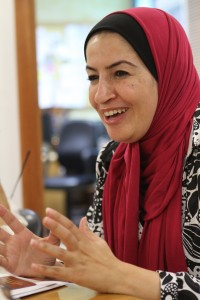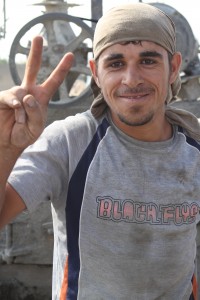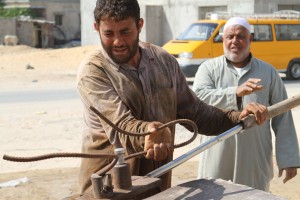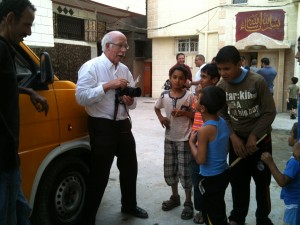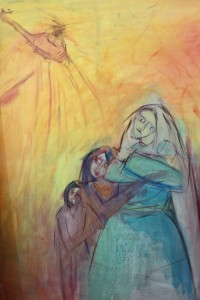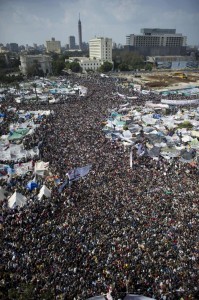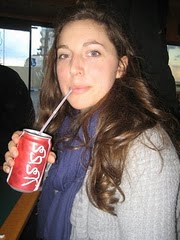By Gerri Haynes
(Gerri Haynes, a former president of Washington Physicians for Social Responsibility, is sending back reports from inside blockaded Gaza. As she did three times before, Gerri organized a team of doctors and other health care providers to work in hospitals and clinics in Gaza in an effort to directly help the people there and to bring attention to the ongoing humanitarian crisis that the Israeli blockade has created. Third in the series.)
The huge garbage dump across the street and the dumpster dump next to the primary Qattan seem to disappear when the lights and books and activities of the Center open to children and families. The energy and hope of Reem buoy up all who encounter her.
Today, we also visited a Qattan outreach program in the Samouni area. During Operation Cast Lead, after being herded together into one small building, twenty-six members of the Samouni family were killed by Israeli fire. Samouni children witnessed many deaths and the destruction of their homes. Now, under the care of Qattan, the family’s children spend four hours/day in healing care: art, physical activities and reading. Testing of these children has proved that this care is helping them to cope with the tragedy that befell their family.Yesterday afternoon, we visited a young man from Bethlehem who was released from prison in the recent prisoner exchange. He is not allowed to return to his home, but speaks frequently on the phone to his Bethlehem friends. For now, he must stay in Gaza. There was a gathering of family members whose loved ones remain in Israeli prisons. Several women spoke to us of their loved ones who have not come to trial and yet remain incarcerated. One woman told us with great sorrow that her son has been in prison for many years – he was jailed at age 11. http://www.parliament.uk/edm/2010-12/2274?mid=50
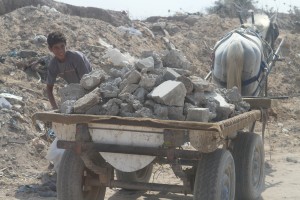
Gazans gather chunks of concrete from bombed buildings to re-use in construction (Photo by Bob Haynes).
The mental health of Gaza suffers from constant threat and continuous deprivation caused by recurrent military attacks and the siege. Mental health providers we talked with today spoke of “learned helplessness” – and the ways that providers can continue to provide care: group meetings, close supervision, continuing education and family time. The spirit of the people of Gaza is tremendous.
By Gerri Haynes
(Gerri Haynes, a former president of Washington Physicians for Social Responsibility, is sending back reports from inside blockaded Gaza. As she did three times before, Gerri organized a team of doctors and other health care providers to work in hospitals and clinics in Gaza in an effort to directly help the people there and to bring attention to the ongoing humanitarian crisis that the Israeli blockade has created. Second in the series.)
The three physicians in our group spent today in clinics and operating rooms – teaching and consulting. We are busy working on the schedule prepared for us by Amani at the Gaza Community Mental Health Programme. Maxine Fookson, nurse practitioner from Portland, gave a lengthy training and facilitated a discussion for nurses on postpartum depression. In Gaza, where the threat of attack by Israel is constant, women report that giving birth is accompanied by the additional stress of insecurity – will life continue or will it be suddenly ended by another attack from the air?
Still, Gazans say that Gaza is beautiful and, looking out over the polluted water near shore, it is possible to imagine a clean and welcoming sea – one that would offer badly needed fish protein that would be safe to eat. We are enthusiastically greeted again and again by people we have met during previous trips and we are rewarded by the grace and generosity of Gaza’s people.But the trauma of living in the world’s largest open-air prison continues. In a meeting tonight with a child and adolescent psychiatrist and a clinical psychologist from the Gaza Community Mental Health Programme, we heard the term, “Learned helplessness” – the reality that people living under siege learn that even if they are educated and eager to work, the lack of jobs and lack of ability to change the external control on their lives gives them a deep sense of helplessness. Hope lies in the possibility that Gaza will be opened to the world – that politicians will realize the absolute need to free Gaza and allow Gaza’s people to heal. For now, the lack of access to clean water (the water of Gaza is 95% polluted), clean air, safe soil, adequate classrooms for education (children are double and triple-shifted in schools), jobs, adequate housing – the list is long – makes living difficult for these courageous people.
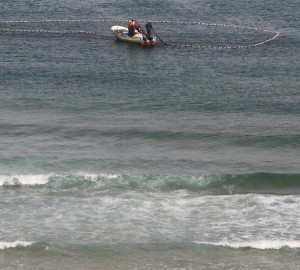
Israel restricts fishing to shallow, non-productive areas along the coast of Gaza (Photo by Bob Haynes).
From the director of the nursing association, we learned that there are many more nurses in Gaza than there are available jobs. More hospital beds are needed (unable to be built because building materials are forbidden). These beds could mean increased placement for nurses and more access to care for the population. Kara Mochan, nurse practitioner, is working on plans to assist with specialist education for nurses here. There are answers to the public health needs of Gaza, but until the power of freedom is granted, the awakening of our conscience regarding their plight compels us to continue asking for help for this land.
By Gerri Haynes
(Gerri Haynes, a former president of Washington Physicians for Social Responsibility, will be sending back reports from inside blockaded Gaza. As she did three times before, Gerri organized a team of doctors and other health care providers to work in hospitals and clinics in Gaza in an effort to directly help the people there and to bring attention to the ongoing humanitarian crisis that the Israeli blockade has created. First in the series.)
Five members of Washington Physicians for Social Responsibility and one intrepid member of Oregon Physicians for Social Responsibility arrived in Gaza yesterday – hoping to provide medical care and consultation to this besieged population. This is the fourth WPSR delegation to travel to Gaza in the last two years.
The 1.6 (or more) million people of this small strip of land are captives of a situation that offers them no free access to the rest of the world. Once, they were able to move relatively freely through Palestinian and Israeli lands. Many Gazans worked daily in Israel. Many visited their families in the West Bank. For nearly five years, the only “free” movement has been through the dangerous tunnels that connect southern Gaza with Egypt. More on that below!
We made our way to Gaza through Israel, Jerusalem and Bethlehem, meeting interesting people along the way.
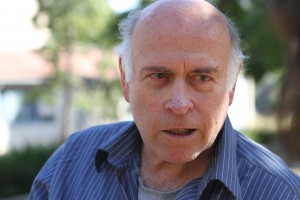
Amos Givertz, an Israeli working to help the Bedouin population of the Negev Desert (Photo by Bob Haynes).
Laura Wharton is a member of the left-wing Meretz Party in Israel and was elected to serve (without pay) on the Jerusalem City Council. She met with our group at the Notre Dame Hotel to talk about actions to increase services to Palestinians living in East Jerusalem. She says Arabs are rapidly immigrating to East Jerusalem and the cost of housing is sky-rocketing. Issues of water and infrastructure such as schools in East Jerusalem remain challenging for the City Council. One complicating factor for management of City finances is the presence of a large number of ultra-orthodox Jews in West Jerusalem. The ultra-orthodox do not have to work, serve in the military or pay taxes, yet receive social services and stipends for studying in the Yeshiva.
We were to cross (by permit) into Gaza on Thursday but the border was closed for a holiday. Friday morning, we crossed through to the Gaza side with no difficulties and were joyfully greeted by our hosts from the Gaza Community Mental Health Programme. Gaza has experienced many attacks by the Israeli military since our last visit here and we witnessed some of the building destruction as we traveled.
Our group is comprised of three physicians and three nurses and following a brief tour, Rich Grady and Laura Hart began their work by screening more than 30 urology patients.
During our tour, we witnessed several community celebrations – people gathering in the streets – welcoming home prisoners who were released this week by Israel in the prisoner exchange for the Israeli soldier, Gilad Shalit.
We stopped to meet with one prisoner who was held for 26 years in various Israeli jails for having participated in protests against the Occupation. He said he had not killed anyone. Sitting near this prisoner was his son, an attorney, who was eight months old when his father was imprisoned and the prisoner’s brother whose own son was killed recently in Gaza in a targeted assassination by Israeli forces. The released prisoner requested that Human Rights activists seek a review of conditions in Israeli jails. He learned two days prior to his release that he was to be set free. He had had no contact with his family since 1995.Traveling south, we stopped at the Rafah border to witness the preparation of another tunnel from Gaza to Egypt. These tunnels carry goods into Gaza and provide a lifeline around the ongoing siege while the people of Gaza continue to hope for a peaceful resolution to the conflict between Palestine and Israel.
As of today, journalist Dorothy Parvaz has been detained in Syria for eight days. We need to get the message out that the World community won’t allow journalists to be detained for doing their job! What you can do: Call the Syrian Embassy in D.C.
(202-232-6316, ext. 139) to politely press for Dorothy’s release.
E-mail: as1@syrembassy.net or consular@syrembassy.net
The video below starts out with 10 minutes or so about Dorothy Parvaz done by Enrique Cerna of KCTS with me and Melanie McFarland, a close friend of Dorothy’s and like me a former colleague at the Seattle Post-Intelligencer newspaper in Seattle.
Watch the full episode. See more KCTS 9 Connects.
By Talat Hamdani
“What’s Radicalizing American Muslims?” asks Peter King, (Newsday – December 19, 2010).
Mr. King, the U.S. Representative for New York’s 3rd Congressional district, who will take the reins as chair of the House Homeland Security Committee next year, announced his plans to investigate Muslim Americans last week and to hold hearings on the subject when the House re-convenes in January, 2011. In his Newsday article he alleges that no moderate Muslims have spoken out against terrorists, “no moral outrage or condemnation”. He cites his own record of working with the Muslim community in his district and his support for President Bill Clinton’s military offensives in Bosnia in 1995 and Kosovo in 1998. We do not doubt he is an honorable man.
Mr. King’s planned hearings on Muslim communities are reminiscent of the McCarthy hearings of the 1950’s. His accusations bear no basis in reality. For instance, since 2002, the Council on American-Islamic Relations, (CAIR) has clearly condemned violence with open letters in major newspapers both local and national, announcements on TV and radio and worked with Mosques around the country to develop interfaith forums. In addition to specific campaigns, they have compiled a 68 page document showing all of the condemnations of terrorism after September 11th, 2001. It is unfortunate Mr. King missed all that. But, like Senator McCarthy, Mr. King is a true patriot.
The results of a study done by David Schanzer, Sanford School of Public Policy at Duke U., Charles Kurzman, U of N.C., Chapel Hill and Ebrahim Moosa of Duke U., called AntiTerror Lessons of Muslim Americans, identified characteristics and practices of Muslim American Communities that are preventing radicalization and violence.
Public and private denunciations of terrorism and violence.
• Self policing by confronting individuals, preventing radicals from preaching in mosques, working with law enforcement and developing youth programs to address concerns that might lead to radical behavior.
• Community building to reduce isolation of Muslims.
• Polictical engagement which channels grievances into democratic forums and integrates Muslim Americans into the American mainstream.
The recomendations of the study can be found atthinkprogress.org/2010/08/08/mosques-deterrent.
Mr. King seems to have overlooked it, although he is a knowledgable man.
In February of 2003, Dr. Muqtedar Khan, Director of Inernational Studies at Adrian College, MI, and a member of the Association of Muslim Social Scientists at the Center for the Study of Islam and Democracy said, “I would rather live in America under Ashcroft and Bush at their worst, than in any Islamic state established by ignorant, intolerant and murderous punks like you and Mullah Omar at their best.” Mr. King in his claim that moderate Muslims have not spoken out against violence and terrorism seems to have overlooked this statement directed at Osama Bin Laden. Although Mr. King is “immersed in attempting to unravel the radical Islamic threat to our nation and our civilization”, this one got by him. But we know he is an honest and forthright man.
In addition, we know that the so-called “Christmas bomber, Umar Farouk Abdulmutallab, from Nigeria, was turned in by his own father. His father is a ‘moderate Muslim”. We know that the Times Square bomb was first reported by a Muslim merchant, Aloune Niass. No radical extremist is he. According to FBI Director, Mueller, the American Muslim Community is co-operating with the FBI and since 911, ten terror plots have been foiled by their help.The the case of undercover FBI agent, Craig Montielh, in Irvine, Ca is a case where the Muslim community took out a court order of protection against him. He is suing FBI for entrapment of Muslim American. In his article, What Patriotism Is and Is Not, Michael Winship (TruthOut, July 3, 2008) states, ” It is an unmistakable lesson of history that when one group of people starts to see another group of people as ‘other’ or as ‘different’, as ‘undeserving’, as ‘inferior’, ill treatment inevitably follows.”
The lessons of history must be learned lest we repeat the mistakes of the past, horrors still vivid in the memories of many of us, even of Mr. King.The nation has to heal. Mr. Kings actions reek of suspicion, revenge and further divide our country. We hope he reconsiders his misguided undertaking and reaches out to those in the Muslim community working to bridge the divide and form a true interfaith coalition for peace.
Talat Hamdani is an American who became a commentator after her son was killed during the attacks on September 11, 2001. Her son, EMT Mohammad Salman Hamdani, was a New York Police Department cadet.
(Don’t miss great comments from Egyptian protester in video at end of post.)
From Al Jazeera:
Hosni Mubarak, the Egyptian president, has resigned from his post, handing over power to the armed forces.
Omar Suleiman, the vice-president, announced in a televised address that the president was “waiving” his office, and had handed over authority to the Supreme Council of the armed forces.
Suleiman’s short statement was received with a roar of approval and by celebratory chanting and flag-waving from a crowd of hundreds of thousands in Cairo’s Tahrir Square, as well by pro-democracy campaigners who attended protests across the country on Friday.
The crowd in Tahrir chanted “We have brought down the regime”, while many were seen crying, cheering and embracing one another.
“Tonight, after all of these weeks of frustration, of violence, of intimidation … today the people of Egypt undoubtedly [feel they] have been heard, not only by the president, but by people all around the world,” our correspondent at Tahrir Square reported, following the announcement.
Pro-democracy activists in the Egyptian capital had marched on the presidential palace and state television buildings on Friday, the 18th consecutive day of protests.
Read the full story here.
See streaming video of developments in Egypt on Al Jazeera here.
And here are just a few of the hundreds of Facebook comments on the “We are all Khaled Said” page:
We are all Khaled Said
I CANT BELIEVE IT … FOR 30 YEARS .. 30 YEARS OF DICTATORSHIP… MUBARAK RESIGNSSSSSSSSSSSSSSSSSSSSSSSSSSSSSSSSS …………………
BACKGROUND STORY ABOUT KHALED SAID
Khaled Said, a 28-year-old Egyptian from the coastal city of Alexandria, Egypt, was tortured to death at the hands of two police officers. Several eye witnesses described how Khalid was taken by the two policemen into the entrance of a residential building where he was brutally punched and kicked. The two policemen banged his head against the wall, the staircase and the entrance steps. Despite his calls for mercy and asking them why they are doing this to him, they continued their torture until he died according to many eye witnesses.
Khaled has become the symbol for many Egyptians who dream to see their country free of brutality, torture and ill treatment. Many young Egyptians are now fed up with the inhuman treatment they face on a daily basis in streets, police stations and everywhere. Egyptians want to see an end to all violence committed by any Egyptian Policeman. Egyptians are aspiring to the day when Egypt has its freedom and dignity back, the day when the current 30 years long emergency martial law ends and when Egyptians can freely elect their true representatives.
It is believed that Wael Ghonim is the creator of the Facebook page “We are all Khaled Said” and that he works with a colleague in England on the website. Wael Ghonim is a Google executive in Cairo who played a vital part in the Internet discussions on Facebook that helped spark the rebellion in Egypt. Wael Ghonim was held captive for 12 days by Egyptian security forces shortly after the protests began.
(from YoutTube)
http://playingforchange.com – Hello everyone, today we are honored to share with you all the first video from our new CD/DVD titled, “Songs Around the World, Part 2”. This video is a version of “Redemption Song” performed around the world in honor of Bob Marley’s birthday. We have reunited Bob with his son Stephen and the support of the entire planet. In this song there is a felling of rising above the past and moving forward with love in our hearts and hope in our eyes.
Follow the link below to pre-order the album and support Playing For Change by telling all your friends and family to join the movement.
Pre-Order “Songs Around The World, Part 2” now on Amazon.com: http://amzn.to/PFCsatw2
WRITTEN BY TOMI LAINE CLARK
COMMENTARY
(To read more of Tomi’s writing, go to her bog: Disenchanted Princess, Peace through truth)
The U.S. has lost all credibility, as well as the opportunity to be relevant, in the region.
Popular uprisings in Tunisia, Egypt, and Jordan have been the main topic of news media of late, and while the democratic yearnings of the populace should, in theory, be supported by the U.S., a change in the status quo is the last thing our government wants.
Since the days of Eisenhower, our government has striven to make democracy our #1 export, in the perhaps mistaken belief that any democratic country would be our ally. Israel was the first country in the Middle East to get the American stamp of approval and, since its inception, this tiny state the size of New Jersey has received a total of $140 billion of aid (source), $53 billion of which was military aid (source). This is a symbol of America’s “special relationship” with Israel.
But what about our special relationships with the dictatorships of Tunisia, Libya, and Egypt, and the monarchies of Morocco, Jordan, and Saudi Arabia? Are we “supporting” them to the tune of billions of dollars annually in the innocent hopes that they will voluntarily enact democracy in their countries? Since 1987 (the year Tunisia’s Ben-Ali took power), the U.S. has sold $349 million worth of weaponry to Tunisia (source). US military aid to Egypt totals over $1.3 billion annually (source). We gave Jordan $666 million worth of military aid in 2007 alone, spending $80 million of that on an anti-terrorism training center (source). All these countries either have rigged elections or no elections at all and we have propped up their governments with billions of dollars worth of military aid for decades. We even provided the gas with which Saddam Hussein committed an act of genocide against his own citizens (source), an act we apparently didn’t consider reprehensible until 20 years later.
In fact, during the Iran-Iraq war, we provided weapons not only to Iraq, but Iran as well, and even sent the proceeds of that arrangement to the Nicaraguan Resistance, which resulted in a little scandal called Iran-Contra. And now we lambaste Iran for providing funding and weapons to the Lebanese resistance, Hezbollah. We call Hezbollah Iran’s proxy and say “no fair”, and meanwhile we have dozens of our own proxies that we fund and equip on a fantastically larger scale.
And now the citizens of all these countries call us hypocrites (like here), and we have the gall to build anti-terrorism training centers that are supposed to shield us from the results of our own actions.
Once upon a time, the U.S. had a chance to be truly relevant in the Middle East by brokering a lasting peace agreement between the Israelis and Palestinians. We said we wanted peace, we sent our ambassadors and negotiators jaunting back and forth between Israel, Lebanon, Syria, Palestine, Egypt, and elsewhere. But, more than ever, it seems like that was play acting, what many political analysts refer to as “stagecraft” rather than statecraft. And now, with the Palestinian Authority seeking recognition from UN countries directly, without America’s support, it is even clearer that we are no longer needed.
The Palestinian cause is the poster child of injustice in the region. Everybody from Morocco to Qatar knows that the Palestinians are increasingly subjugated and abused in myriad ways by the U.S., who continues to fund the Israeli military machine at the rate of $8 million a day while expecting the citizens of our ally countries to believe that we are doing so because Israel is under threat (source). If Israel were to be attacked, the chances are staggering that it would be bombed with our missiles, dropped from our planes, by soldiers whose salaries are paid by our tax dollars.
We are financing war because it is more profitable than peace, and the Middle East, at least, is tired of the status quo.
We have lost our chance to be relevant. If we want a chance to survive at all, with any moral dignity, we need a drastic change of plans.
Tomi Laine Clark is currently doing research for her degree in Middle Eastern Studies at UC Berkeley. She lives in San Francisco.
BY AMAL SEDKY WINTER
To see more of Amal’s writing, go to her blog: “My Eye on Egypt.”
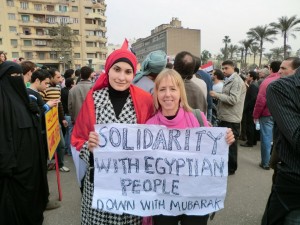
A CODEPINK delegation of women is in Tahrir (Liberation) Square with the democracy demonstrators. CODEPINK co-founder Medea Benjamin is on the right. CODEPINK is a women-initiated grassroots peace and social justice movement working to end the wars and redirect resources into healthcare, education and other life-affirming activities.
My 26-year friend, Adham Bakry, a graphic artist protesting in Tahrir Square was interviewed by BBC on Monday Feb 1st, 2011. Some of you, as I did, may have heard him. His said he was demonstrating for social justice; his words were not inflammatory. Yesterday, Mubarak’s goons chased him down, separated him from his American companion, Christina, roughed him up and took her to the American Embassy. They shoved Adham in a cab and dropped him in a Cairo slum district, Bulaq Durfur. They flaunted his passport with its entry visas to many countries and accused him of being involved in a foreign conspiracy. The ignorant, misinformed and manipulated residents beat him up until a young man on a motorcycle rescued him. Adham got home 8 hours after he left the square.
I suspect he will find a way back despite rumors that today the protesters will be even more roughly treated.
The protesters are holding 35 men whose identity cards prove they’re employed by internal security. They also have people who admitted to being paid by the government to beat up the demonstrators.
Ahmed Shafik, Prime Minister, rumored to have threatened to resign over yesterday’s government attack on the anti-Mubarak demonstrations, at a news conference today apologized for the clashes and promised to meet with the protesters and investigate the violence. Current and past cabinet members have been prevented from leaving the country.
He claimed the government didn’t have enough police to control the situation. (Egypt has 1 policeman for every 37 citizens.) In another turning of logic on its head he said the terrible way in which our young are behaving, are embarrassing the country and allowing a country only 200 years old tell — we who invented government — how to govern ourselves.
The propaganda machine is at full-throttle but all else has come to a halt. Sympathy for the man, who fought against Israel, loves his country and wants only to die in the land where he was born, spreads easily. Dignity is important. It’s estimated that the Egyptian economy has lost 35 billion dollars in the past 10 days and money is streaming out of the country with a tap of a computer key. People are confused and frightened and rumors are rife—most planted by the propaganda machine.
Amal Winter is an Egyptian-American psychologist in Seattle who currently lives in Cairo, Egypt during the academic year where she is Visiting Professor of Practice at the American University in Cairo’s Graduate School of Education. She is a member of Psychologists for Social Responsibility, the Arab American Community Coalition in Seattle, and the Arab American Institute’s Pacific Northwest representative. Her numerous consulting positions include the U.S. Department of State where she trains women in the Middle East to run for public office and the creation of training programs for panels of mediation specialists in over 450 Egyptian family courts.
Previous posts by Amal:
Thousands taking to the streets of Egypt’s major cities despite government crackdown
From Cairo: ‘For the first time in my life, I see real pride in their faces
Egypt in Revolt: People who have been disgusted by their country are standing up for it
Egypt in Revolt: The Empire strikes back
WRITTEN BY AMAL SEDKY WINTER
To see more of Amal’s writing, go to her blog: “My Eye on Egypt.”
CAIRO, Egypt — Last night (President Hosni) Mubarak promised that the current parliament would study the two constitutional articles that limit the rights of people to run for elected offices including the presidency for which he promised not to run again.
The military told people to go home.
Today, Mubarak and his regime mobilized a counter-revolution and sent hundreds of ‘pro-Mubarak’ demonstrators (There is clear evidence in the form of ID cards that these are the regime’s police accompanied by armed bands of their notorious thugs) to attack the thousands of anti-Mubarak protestors in Tahrir Square. Having defined the issue as stability (a matter very close to the Egyptian heart) and chaotic violence (of which people are terrified), they proceeded to create the conditions with which they threatened the country.
Anti-government supporters held their ground, calling for army protection.
Two and a half hours of clashes, many injured, but yet the military stood aside. Although it had plenty of tanks and armored vehicles in place, it let hundreds of people mounted on roughly 60 horses and camels which definitely posed a safety risk enter the square. They were accompanied by police officers from state security and “escaped” criminals (reportedly released by the regime) carrying signs “Daddy Mubarak and Mommy Suzanne, we apologize for the past days’ demonstrations.” Pelting them with rocks and cracking heavy whips, the riders rammed the protesters.
There was nothing spontaneous about this attack. Organized groups joined them, a hundred at a time. These people were well coordinated; their signs and placards preprinted. They blocked every entrance to the square so that people could not join the anti-Mubarak demonstrations. No one could leave, so they dug up paving stones.
Fears of a blood-bath to follow, they are praying in the square. If the military is not going to protect the people I hope international pressure will work.
The regime propaganda machine, especially government television, has been in full swing mostly frightening the populace while calling for calm. Meanwhile there’s no attempt to contain the violent confrontations.
Unfortunately, the combination of unprecedented concessions, the campaign of disinformation, and the staged confrontations have had their effect. Those less sophisticated — and this applies to many of the poor and uneducated — are switching from opposition to Mubarak to supporting him, and the stability and personal safety he promised.
P.S. Rumors that Ahmed Ezz, parliamentarian and Gamal Mubarak’s friend, has been prevented from leaving Egypt. Habib Adli, minister of Interior has been held for investigation by the army (which hates him).
Amal Winter is an Egyptian-American psychologist in Seattle who currently lives in Cairo, Egypt during the academic year where she is Visiting Professor of Practice at the American University in Cairo’s Graduate School of Education. She is a member of Psychologists for Social Responsibility, the Arab American Community Coalition in Seattle, and the Arab American Institute’s Pacific Northwest representative. Her numerous consulting positions include the U.S. Department of State where she trains women in the Middle East to run for public office and the creation of training programs for panels of mediation specialists in over 450 Egyptian family courts.
